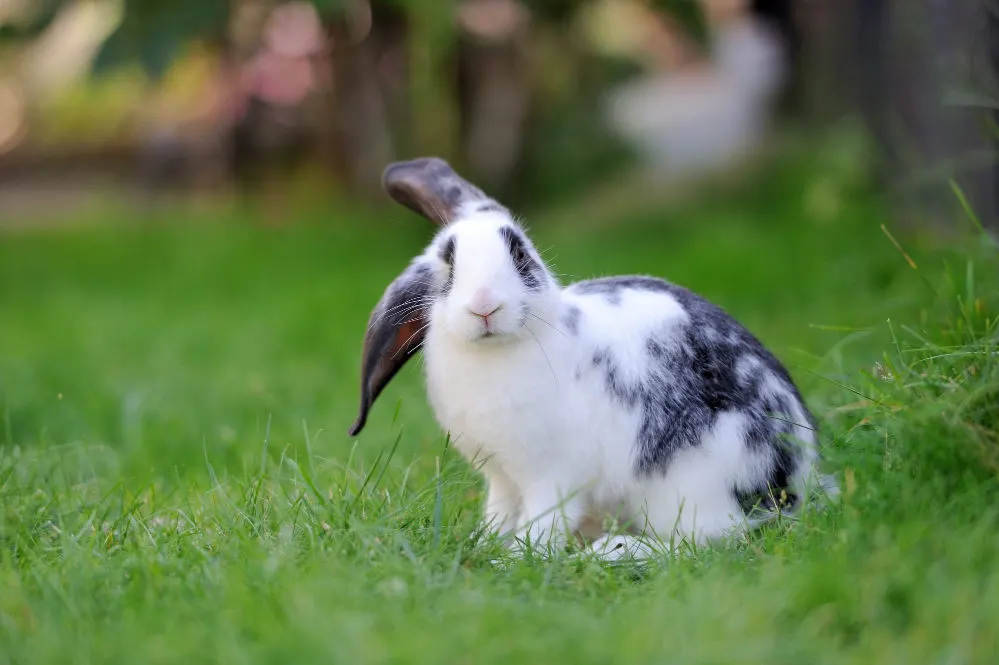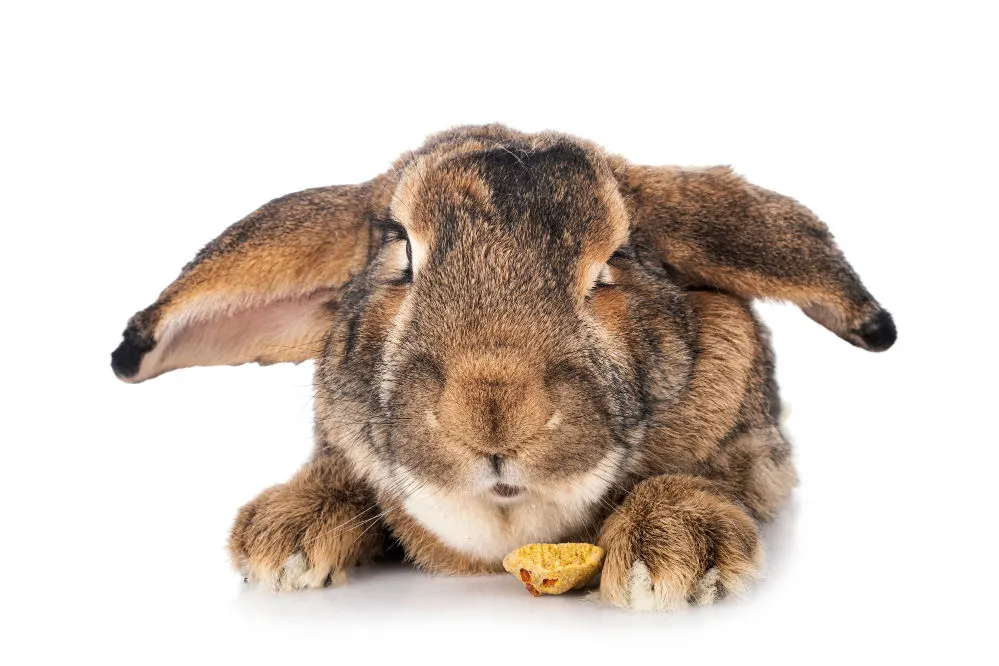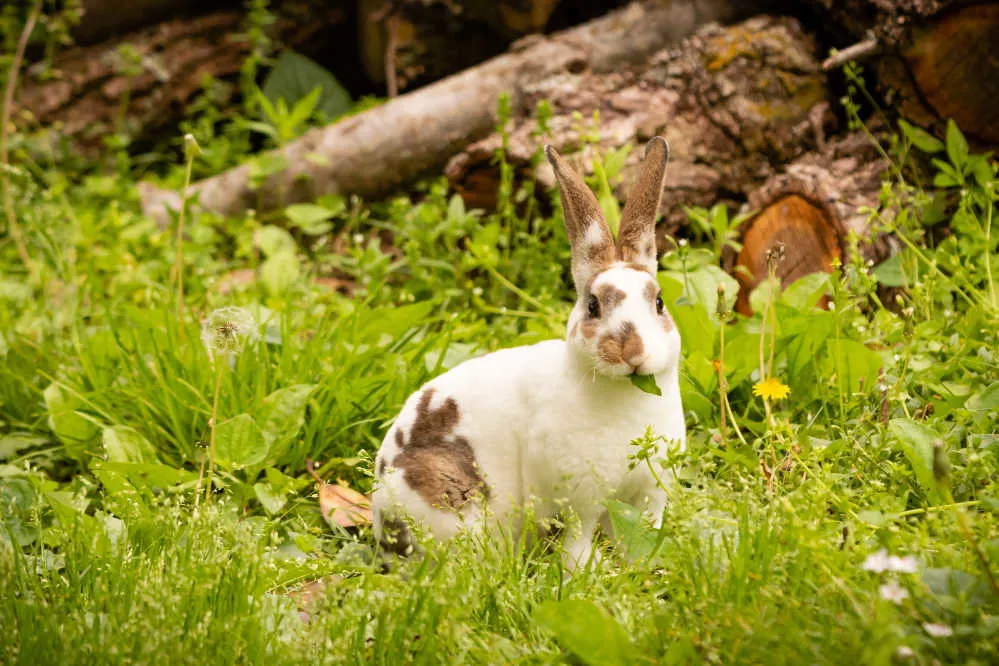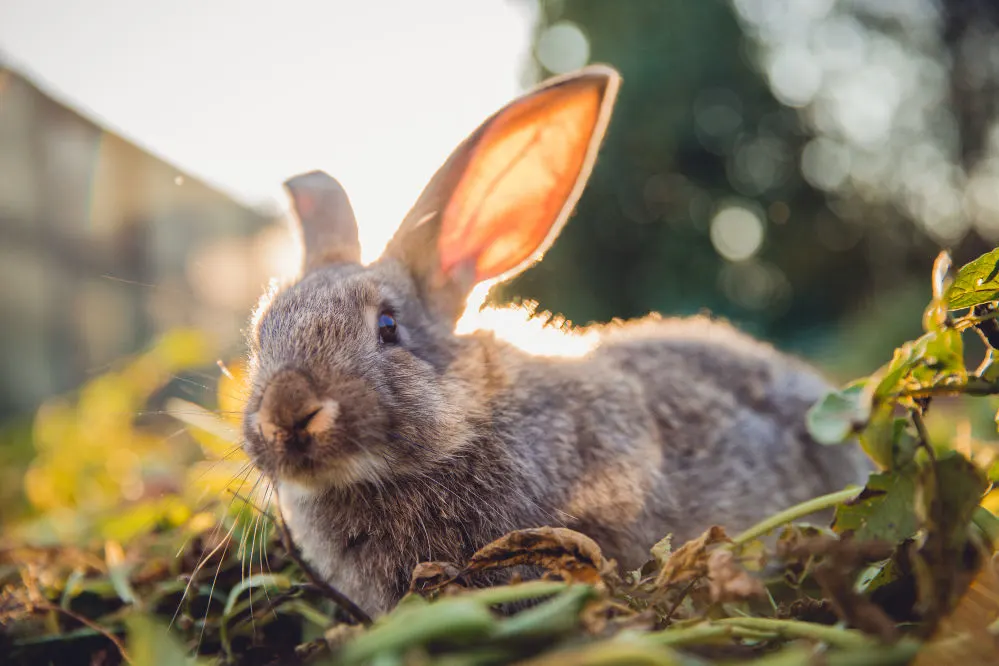If you’re the proud parent of a fuzzy bunny, you’ll understand the overpowering urge to spoil your precious baby with a little treat. You might have seen on TV that sometimes people like to give their bunnies a little milky treat, but can rabbits even drink milk in the first place?
As a good fur-parent, you know that you have the best indoor rabbit and want only the best for your pet.
This guide is here to answer any burning questions you might have about your rabbit’s dairy intake and to caution you against the possible dangers that threaten the health of your furry friend.

Is cow milk safe for rabbits to drink?
It’s true that baby bunnies do consume milk from their mothers, but this does not mean that any milk, like a cow’s, is fit for their consumption. In fact, cow’s milk is not safe for either a baby or adult rabbit, and if they were to drink too much, it could have disastrous consequences.
The only liquid your rabbit should be drinking regularly is fresh water, either from a water bottle or water bowl depending on your rabbit’s temperament.
They should be consuming at least two cups of water a day, but they can also get hydration from their fresh foods, such as leafy greens.
What health problems does cow’s milk cause in rabbits?
Like some humans, rabbits are lactose intolerant, especially when they reach adulthood. Their stomachs are not equipped to digest the main protein found in cow’s milk. If they drink too much of it too often, they could develop serious gut problems like gastrointestinal stasis (GI stasis).
This is when the food that your rabbit is digesting stops moving through their system, so their digested food essentially becomes stuck in their stomach with no way to purge it. This is especially worrying, seeing as rabbits cannot vomit poorly digested food, and GI stasis usually inhibits their bowel movements as well.
The reason for this is that cow’s milk has a completely different nutritional makeup compared to the milk produced by rabbits for their young. The protein and calorie content is much lower than in rabbit milk.
There are also a lot of other things in cow’s milk, like medicines, blood, and hormones, that linger after the milking process, which is detrimental to your rabbit’s gut health. Humans are actually one of the only species that can safely consume cow’s milk on a regular basis. Even if you like to share, it’s best to keep that milky goodness to yourself.
Can rabbits have other dairy products?
The short answer is a resounding no. Remember that your pet rabbit’s diet is almost entirely comprised of solid food, so giving them dairy products like cheese or cream would not be a good idea, especially for their digestive health.
The only permissible case, on extremely rare occasions and only under a vet’s prescription, is that you can give your rabbit some plain yogurt if they are suffering from diarrhea. The yogurt can help reintroduce and rebalance bacterial growth in their gut to regulate their bowel movements.

But this can only be in small amounts on an occasional basis. Regular yogurt treats can be just as detrimental to your rabbit as cow’s milk, but more so because the sweetness can cause tooth decay.
What happens if my rabbit accidentally drinks cow’s milk?
If your furry friend sneakily takes a lick from your bowl of cereal, you don’t have to rush to the nearest vet. A small amount of milk will not harm them in any significant way, but this does not mean it should ever be permissible.
To be safe, you should keep a close eye on your bunny’s poop. What does rabbit poop look like? A healthy bunny’s poop should look like multiple small, hard pellets, and they should be pooping at least every twelve hours.
Dairy will definitely have an effect on their poop if they’ve had too much of it, and softer or missing stool pellets are your first sign that your bunny is ill. So watch closely.
What type of milk can domestic rabbits drink?
Milk is only ever good to feed baby rabbits, as rabbits will usually start switching to solid foods from six to eight weeks. If, for whatever reason, you are caring for a baby bunny without its mother, then there are a few alternative milk formulas you can use for feeding.
The first and best option is to find another nursing female rabbit. There will be no better nutritional or safer option than the milk that is specifically meant for them. But if you don’t have access to another nursing bunny, then do not panic.
You can get a special formula known as Kitten Milk Replacer (KMR) as the next best thing. This is a type of milk formula for kits (not to be mistaken for a formula for baby cats) that has a higher calorie and protein content that baby bunnies need.
Another alternative is goat’s milk for the same reasons. However, goat’s milk is a better alternative to use if you’re feeding a baby wild rabbit, while KMR is better for domestic rabbits. You can read more about the comparison between these milk alternatives here.

The jury is still out as to whether almond milk or soy milk is safe for rabbit consumption. Until more research comes out to confirm its safety, the most important thing is to just steer clear of this kind of milk altogether instead of risking disastrous consequences.
How should I feed young bunnies in the wild?
If you come across a nest of baby rabbits without any adult female rabbit nearby, you should first wait and see before deeming them orphans and swooping to their rescue. The mother rabbit will often leave her newborns alone in the nest for most of the day to keep predators away, so just because they’re alone doesn’t mean they’re starved!
If you have seen that the nest has been abandoned for more than a day, then it’s relatively safe to try and feed the bunnies. In the wild, these bunnies will only drink from their mother’s milk once a day for only five minutes.
This is enough milk for them because the milk has a higher calorie content suited for the bunnies’ less frequent feeding.
When feeding alternative milk formulas to young rabbits, you should try to feed them through a syringe or a stop-dropper. Overfeeding a rabbit is just as dangerous as underfeeding them.

For newborn to one-week-old bunnies, you should feed them about 0.7 – 0.8 oz (2 – 2.5 ml) twice a day. From one to two weeks, you can raise the dose to 0.17 – 0.24 oz (5 – 7 ml) also for twice a day. Not every bunny is the same, though, and some might wean off the milk sooner than others. You should still try to offer them a drink until they are eight weeks of age but don’t force-feed them.
What else can pet rabbits safely drink?
As said, the best and safest liquid for your furry friend is some fresh water. This is not only because they need to stay hydrated and can drink quite a bit of it: it is also the best drink for their digestive system.
Nonetheless, there are a few other rabbit drinks you can give out as a treat — only as a treat. Your rabbit might enjoy a taste of some apple juice when used as flavoring for their water. You can also add an unsweetened carrot to their water for flavor, but not all the time.
Some rabbits also enjoy sipping from cooled down herbal teas like chamomile or peppermint. You should know that if you do let your rabbit drink from your herbal brews, it should come without any sugary (or sugar-free) additives, caffeine, or additional tea leaves.
It’s a good idea to also watch your rabbit’s drinking habits, as any signs of excessive or limited thirst could also be indications of health issues and illnesses like kidney failure or diabetes. Remember, rabbits have sensitive stomachs and are at their best when their diets are healthy.
Final thoughts | Can rabbits drink milk?
It’s completely natural to want to spoil your little bundle of joy. Obviously, you only want the best for your furry friend, but this means that you can’t always share your treats with them.
Long story short, milk, specifically cow’s milk, is not safe for rabbits to drink under most circumstances. Although they are mammals and do consume rabbit-made milk for a small portion of their newborn lives, the milk production in cows is not suited to a rabbit’s needs.
Your safest bet is to stick with water with an occasional flavor treat. But don’t worry, there are lots of other safer ways to treat your rabbit than with a bowl of milk.
Now that you know more about what they can eat, how about learning more about rabbits’ sleep schedules?
Steph Dyson is a travel journalist by trade but a lover of all small pets. She’s been a pet mum to everything from gerbils to guinea pigs, rabbits to hamsters, and fish to dogs of all shapes and sizes. She wants to share her years of experience with small pets and make Small Pet Guides the go-to website for pet owners seeking information and care advice.

